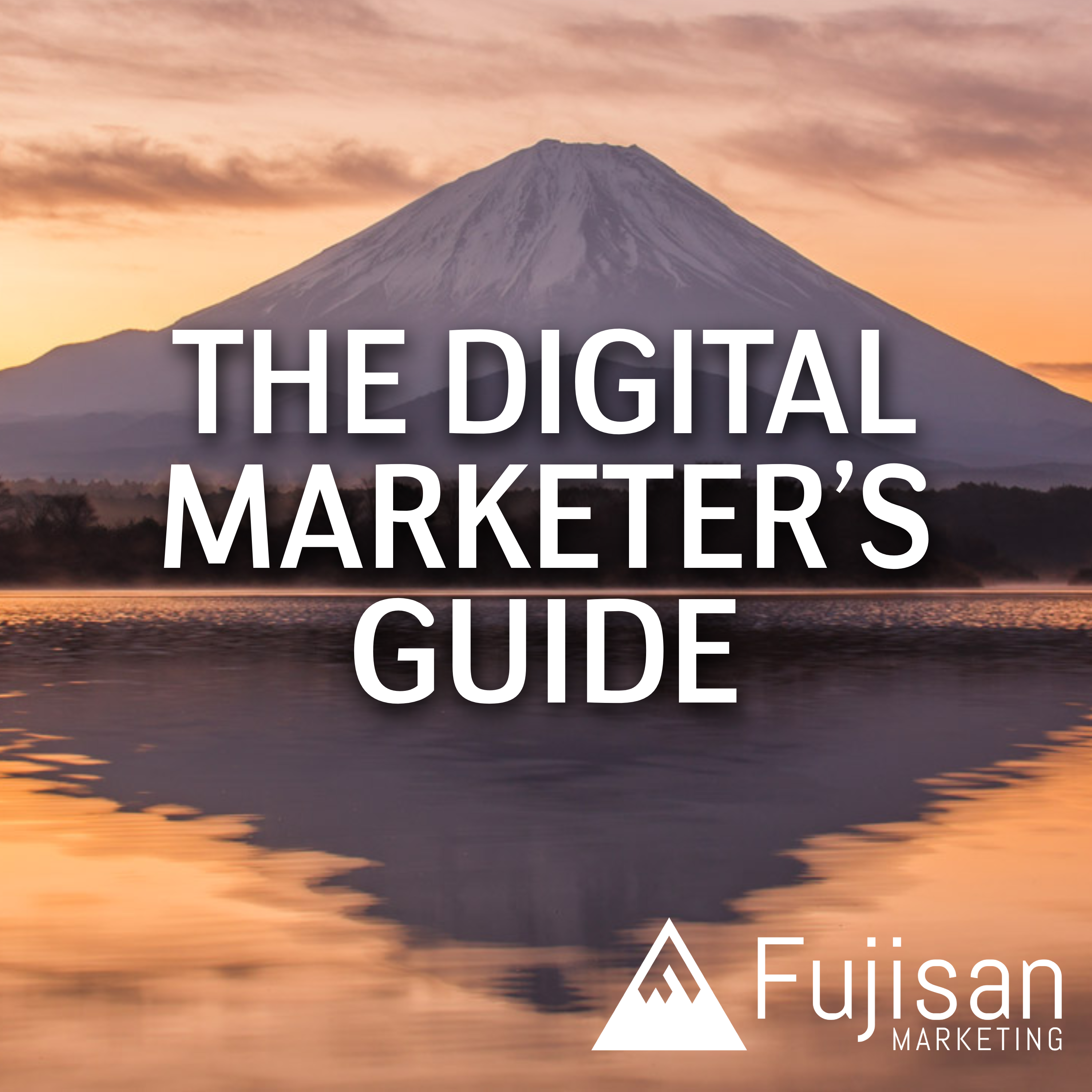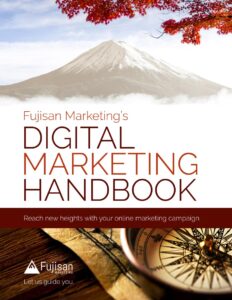Our clients are some of the smartest people we know, and they ask great questions. There are, of course, some questions that tend to crop up again and again, so we want to share our wisdom on those topics. To answer some of the most common questions we get, Victor Madaris discusses Google’s Recommendations, Microsoft Bing, Performance Max (Pmax), CPCs, and more.
Learn more about Fujisan Marketing here or email your questions/comments to contact@fujisanmarketing.com.
Full episode transcript:
Preston Parshall 0:13
Welcome to the digital marketers guide podcast where we break down digital marketing topics into bite sized episodes that can help make your marketing program and you a little better. I’m Preston Parshall, the founder and CEO of Fujisan marketing. We’re here today with Victor Madaris to discuss the most common questions we get asked from our clients at the agency. Victor, welcome to the show.
Victor Madaris 0:36
Thank you. Hello.
Preston Parshall 0:37
So Victor, what are the most common questions we get asked from our clients?
Victor Madaris 0:41
So most of the common questions involve, you know, cost per click cost per conversions, how the conversions are being tracked in the Google ad system. And just overall competition is information that clients are always looking for?
Preston Parshall 0:54
And why do you think they ask us those questions? The questions
Victor Madaris 0:57
are asking more so that they can gauge competition wise, you know, are they competitive with the competition in the market CPCs tend to tie heavily into the competition, if competition is increased, costs necessarily go up. So they’re very interested in just overall just how much they’re spending, and then, you know, just the conversions and the goals that they have set, and how we’re tying those into the overall digital marketing strategy.
Preston Parshall 1:25
And as a digital marketer, which questions do you think are actually more important? And which questions do you find to be less important for improving their digital marketing programs?
Victor Madaris 1:35
So the questions that are not as important for me tend to be the CPC questions. CPCs are something that is determined by Google and their algorithm within the auctions that we have no insight into. While we can use some of the resources that are available on Google to scope out the competition, there’s very little that we can do to really manage the CPCs outside of really maintaining the best practices laid out by Google, other you know, little things that don’t really matter so much to the client would be the conversion setup, most of that really just tends to be just to make sure that everything is set up properly. And we’re not over inflating or under inflating any of the numbers that we’re reporting on.
Preston Parshall 2:16
So Victor, one of the things I love about digital marketing is that we can test anything, and we can test out different ideas, to improve campaigns, and to also talk to our clients about what are some of the early A/B tests, that should be considered in PPC or in digital marketing as a whole.
Victor Madaris 2:32
So some of the early tests that I like to get going our bid strategy tests, when you start a campaign, when you start a new account, there are no conversions that you are able to optimize off of. So you do kind of have to start a little bit broader. Usually, we start out either at a manual or a maximize clicks. And then we’ll test more of a conversion focus bidding strategy, once the data, you know, has appeared into the account. Outside of that testing can involve keywords, so testing broad keywords against the current phrase, match keywords, testing display creatives, as needed, if that is something that you are running with your clients, and you can even do location refinements and testing there as well.
Preston Parshall 3:11
Can you tell me about some of the more interesting tests that you’ve done in the past?
Victor Madaris 3:16
So the Bid Strategy tests I always think are interesting, especially when you are trying to reduce the cost per conversion, or the cost per lead for the clients that I’m working on. What I noticed is Google will recommend various bidding strategies to me based on you know, the algorithm and kind of what it’s learned, when I put it to the test, you know, I get varying results dependent on the client. Some of the recommendations that Google provides that should help improve the performance don’t necessarily do that. And other times when I go into a test and have no faith that it’s going to perform well. It just shocks me and ends up outperforming what I had originally expected.
Preston Parshall 3:57
So what are your thoughts on Google’s recommendations?
Victor Madaris 4:01
So the Google recommendations are beneficial to a point. A lot of that information is for new advertisers, people that aren’t in the systems nearly as much as people who are at the agency. Now for me, the biggest things that I leverage within the recommendations tend to be more so are there any conflicting keywords, have I missed any ad extensions in any particular campaign or ad group, And Google is very quick to let you know if that’s missing, additionally, any sort of negative keyword conflicts are also things that I do tend to keep an eye out for. The ones that I don’t necessarily like are, you know, the budget ones where Google is consistently asking to spend more money or anything where they’re just wanting to make changes without the testing being able to be done prior to it?
Preston Parshall 4:52
We are just a barnacle on a giant whale that’s called Google. So switching subjects, what are your thoughts on Bing? And when would you tell a client to use it? And where have you found it effective?
Speaker 1 5:03
So Microsoft Ads has definitely improved over the course of the last few years. Originally, my answer would most likely have been no if this was five to 10 years ago. Now looking at it, it is definitely something that I do consider dependent on the industry that our client is in, I have seen it perform very well for a couple of different clients, one in the Medicare field, one in the HVAC space, but we’ve been able to really expand our budget on Bing to attract a larger population of users to the website. And we’ve actually seen the cost per conversion, either equal or lower than what we see on Google. We also notice a lot less competition is on Bing, as advertisers aren’t maximizing on that space just yet. So we’re able to find more conversions there than we were on Google.
Preston Parshall 5:53
Yeah, I’d agree with you. Anytime we have a larger campaign where we’re running into volume issues, it’s always good to test out Bing because you can find out find some additional volume, cheaper CPA sometimes. So here’s the thing that’s on everyone’s mind performance max or p max. Victor, what are your thoughts on p max and when to use it?
Victor Madaris 6:14
P max, I don’t really have an opinion on it. Because it is what we have to do with Google, it is pretty much the standard when it comes to a lot now. I do like the fact that it does encompass all of Google’s placements. It encompasses Google Search, Google Display, video, and as well as the discovery network that Google released. So in that case, it’s great because the brand visibility, the brand awareness, is available everywhere. The things I don’t like, are just the limitations and you know, not being transparent with the information that we’re being delivered. Very little insights that I can actually use to help improve client performance is available through the P max campaign. I can’t review what sites we’re targeting, I can’t review audiences down to you know, specific audience performance, and things like that. Google just gives you you know, the top line metrics in terms of you know, this was served X amount of times. But really, those are the limitations that I don’t I don’t really like from the p max. Now, given that I have seen p max work out fairly well on a few clients. So on shopping campaigns, these have been performing fairly well, we have seen ROAS improve alongside when the p max campaign was enabled. So I think the the ability to tie in display creatives video creatives alongside with the products tends to do a lot better than the the traditional shopping campaigns Google released. The one thing that I will note is, if you are doing this for a lead gen campaign, the quality is not always top notch, you will kind of have to go through the irrelevant. The spammy leads to find, you know, the good ones. But that’s kind of what you expect when you’re running on display.
Preston Parshall 8:05
Yeah, in some ways, it feels like a modern response to upgrading GDN. What tools do you leverage in Google ads?
Victor Madaris 8:13
So the tools that you use in Google Ads has been expanding? You know, since I’ve started in the past, I used to only really use you know, the keyword planner, the preview tools, the audience managers and things of that nature. And now I’m tending to use a lot more in my day to day. So some of the bigger ones that I like, using performance planner is great. I get a lot of requests for budget projections, how much more can we spend. And that’s a tool Google provides to you. And it uses real time data to be able to provide you with projections and estimates based on what it thinks will work. Now, I will say I don’t take everything that it gives me and use it. I do take that with a grain of salt, but it is a great starting point. Other things that I like to leverage are the audience managers, really making sure that we have clear defined audiences created. And then the ability to create and run affinity audiences and custom audience groups is also really important. Other things that I like using our the reach planner, this is very beneficial when you have clients that reach out about video and what the what they can expect from a YouTube campaign. Finally, I use the conversions and the reporting the reporting more so just to help me gather and review the data in a much easier way than actually using the actual native campaign UI. So those would be the biggest ones that I use.
Preston Parshall 9:38
Okay. And lastly, what are things to check before launching a new account or campaign?
Victor Madaris 9:43
Alright, so there’s a lot a lot of things here. This is stuff that I’ve learned through trial and error from missing things from when I first started to catching things from people that are managing the accounts now. So first thing I always check is the budget is the budget Correct, are we using the correct daily budget, if that’s what’s needed, we’re not using the monthly budget, we’re not using the total budget and really just making sure that we’re not overspending on the account. Outside of the budgets. The next thing I will definitely look at is the location targeting. If you’re using the Google Ads Editor, it will automatically place the targeting for the entire United States. And this is something that is easily missed. reviewing this making sure that your locations are set up and your targeting exactly where you want to target is important. So that would definitely be another one. Ads, making sure the ads are correct, the headlines all are approved, there’s no issues with punctuation or spelling is good. And then just really making sure that the landing pages are clear. And then they’re all correct for what we’re looking to drive. Finally, just making sure that the keywords are all uploaded, and you know, added to the appropriate ad groups, and there’s nothing that’s being fumbled into a different ad group. And then really making sure your conversions are set up, verifying this through real time Google Analytics, using Google Tag Manager, testing it through an actual ad itself, but making sure that the conversions that are being reported are true and accurate.
Preston Parshall 11:11
That sounds like a great thing to set up a checklist for. Thanks, Victor. And thanks to everyone out there for listening to the digital marketers guide podcast. Be sure to subscribe to stay up to date when a new episode is released. If you have any feedback or topics you’d like to see covered, email us at contact@FujisanMarketing.com or learn more about us at FujisanMarketing.com. See you next time.




